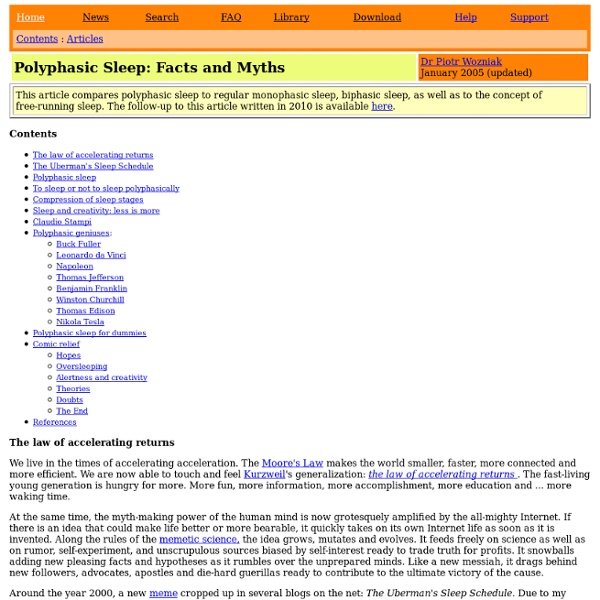Twelve Things You Were Not Taught in School About Creative Thinking
2382 516Share Synopsis Aspects of creative thinking that are not usually taught. 1. 2. 3. 4. 5. 6. 7. 8. 9. 10. 11. 12. And, finally, Creativity is paradoxical. Tags: adversity, contemporaries, creative education, creative geniuses, creative life, creative thinker, creative thinking, education, lighting systems, masterpieces, minor poets, motions, picasso, practicality, profitability, rembrandt, self-help, shakespeare, sonnets, special person, symphonies, thomas edison, wolfgang amadeus mozart
The 90 Best Lifehacks of 2009: The Year in Review
Another year is winding down, and that means it’s time to take a look back at what we’ve done here at Lifehack over the last 12 months. 2009 was a scary year for a lot of people – corporate layoffs, a shaky global economy, stunningly vicious politics, old wars grinding on and new ones flaring up. In the midst of all this, though, many saw opportunities; with the myth of life-long corporate employment shattered as some of the world’s biggest companies teetered on the brink of collapse, entrepreneurship enjoyed a major resurgence. This rise in self-reliance extends beyond our work life, too – people are embracing a do-it-yourself, person-to-person lifestyle where status and the display of wealth matter much less than authenticity and social interaction. All of this is reflected in the posts that went up on this site over the last year. What emerges from all this is a treasure trove of good advice, ranging from the lofty and idealistic to the immediately practical. Software and Technology
The care and feeding of software engineers (or, why engineers are grumpy)
Not too long ago, Jenna Bilotta wrote an excellent article called, How designers and engineers can play nice[1], in which she talks about ways for designers and engineers to work more productively. Having faced similar challenges working with designers (and also working with engineers, when I was on the UI side), I appreciate the pragmatic approach she suggests. It always helps to respect the other role’s process and understand their thinking when working together. One of her points for engineers was not to say “no” so quickly. Our reputation Cards on the table, software engineers generally have a reputation for being arrogant, disagreeable, and moody. (Side note: There are some who will say that’s not true of all engineers, and you’re right. Reputations aren’t randomly given out, they are earned based on experience. Creators, not builders I have a theory. This is something that my very first manager warned me about. Nicholas, you’re worth more than your code. He was absolutely correct.
The 80 Best Lifehacks of 2008
And so we arrive yet again at the end of another year. 2008 was at best a mixed bag – while the world was electrified by the US election and it’s promise of change, the global economy was shaken to its core as a decade of financial mismanagement and willful blindness finally caught up with us. Gas prices spiked, leading us all to ask some difficult questions about sustainability, efficiency, and consumption – and then plummeted, leaving us feeling somewhat relieved, but baffled by the unpredictability of it all. As we roll into 2009, there is an atmosphere of suspenseful anticipation, of hope mixed with not a little uncertainty. Companies are streamlining to prepare for the worst, even as entrepreneurs look ahead to new opportunities. Overall, it seems that now is a time for shaking off the dust, clearing away the debris of the past, and looking towards the future. Here at Lifehack, we’ve always followed a path of cautious optimism. Communication Fitness/Health Lifestyle Productivity
The 100 Best Lifehacks of 2010: The Year in Review
Happy New Year everyone! It’s the first week of 2011 and many of us are getting ready to kick off the brand new year with a big bang. As we start off 2011 with our new resolutions and goals, let us now look back at the best posts at Lifehack in the past year. In this review post, I have gathered 100 of the best LifeHack articles in 2010. Do not attempt to read this whole post at once! Let me start off with the top 10 most popular life hack posts out of the 100s of posts published in 2010. Following which, I’ll present the 100 top articles presented in the 11 catetgories. Top 10 Most Popular Posts in 2010: Overall Personal Growth Maximizing Productivity and GTD Lifestyle and Habits Inspiration & Motivation Goal Achievement & Success Emotional Mastery People Skills & Relationships Communications & Writing Business & Career Creativity & Inspiration Family Miscellaneous Image ©
Tips, Tools, & Tinkering: 110 Years of <em>Popular Mechanics</em> DIY
In one of our very first issues, back in 1902, we told the story of an Illinois schoolboy named Mark Richards, who built an automobile for himself. By saving money from his after-school job blacking stoves, Richards cobbled together enough parts to assemble a runabout that rolled on four skinny tires and was powered by a single-cylinder engine. "I had no knowledge of the principles and practice of gasoline engine construction," Richards said, "yet I not only managed to make it but to build the transmission mechanism, friction clutch, spark-timing mechanism, body running gear, etc., even doing the necessary blacksmithing... If Mark Richards were alive today, he would love the story of Bob Dullam, a sculptor in Kalamazoo, Mich., who received one of our 2009 Backyard Genius Awards for building a replica of the Tumbler Batmobile. In 2012, as Popular Mechanics celebrates 110 years in publication, self-reliance remains a guiding principle of the magazine.



